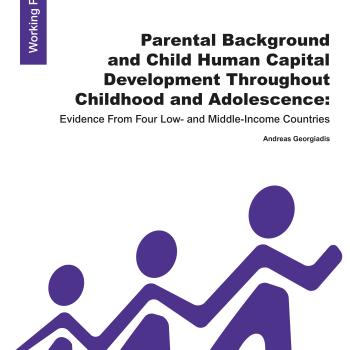Publication Information

Although there are a vast number of empirical studies documenting a strong positive link between parental socio-economic status (SES) and child outcomes, we do not know whether these associations remain robust when other parental background dimensions are controlled. This working paper investigates the association of child human capital indicators with a wide range of parental background dimensions across four low- and middle-income countries, and at different stages of childhood and adolescence, using data from the Young Lives cohort study in Ethiopia, India, Peru, and Vietnam.
The key finding is that parental income is strongly and positively associated with child nutritional status and cognitive achievement across all countries and at all stages of childhood and adolescence, even after controlling for other background dimensions, but the same does not hold for parental education.
Child non-cognitive skills across all countries and at different ages, however, are mostly predicted by the mother’s personality traits reflected in her non-cognitive skills, social capital, and aspirations for the child’s education. Associations of parental background factors with child human capital measures do not change systematically with child age, except that mother’s aspirations for child education exhibits a positive association with child cognitive and non-cognitive skills that is increasing in child age across countries.
Overall, the results suggest that policies that seek to improve the material circumstances of the household and mother’s education and socioemotional competencies may be effective in promoting child cognitive and socioemotional development in low- and middle-income countries.

Although there are a vast number of empirical studies documenting a strong positive link between parental socio-economic status (SES) and child outcomes, we do not know whether these associations remain robust when other parental background dimensions are controlled. This working paper investigates the association of child human capital indicators with a wide range of parental background dimensions across four low- and middle-income countries, and at different stages of childhood and adolescence, using data from the Young Lives cohort study in Ethiopia, India, Peru, and Vietnam.
The key finding is that parental income is strongly and positively associated with child nutritional status and cognitive achievement across all countries and at all stages of childhood and adolescence, even after controlling for other background dimensions, but the same does not hold for parental education.
Child non-cognitive skills across all countries and at different ages, however, are mostly predicted by the mother’s personality traits reflected in her non-cognitive skills, social capital, and aspirations for the child’s education. Associations of parental background factors with child human capital measures do not change systematically with child age, except that mother’s aspirations for child education exhibits a positive association with child cognitive and non-cognitive skills that is increasing in child age across countries.
Overall, the results suggest that policies that seek to improve the material circumstances of the household and mother’s education and socioemotional competencies may be effective in promoting child cognitive and socioemotional development in low- and middle-income countries.

